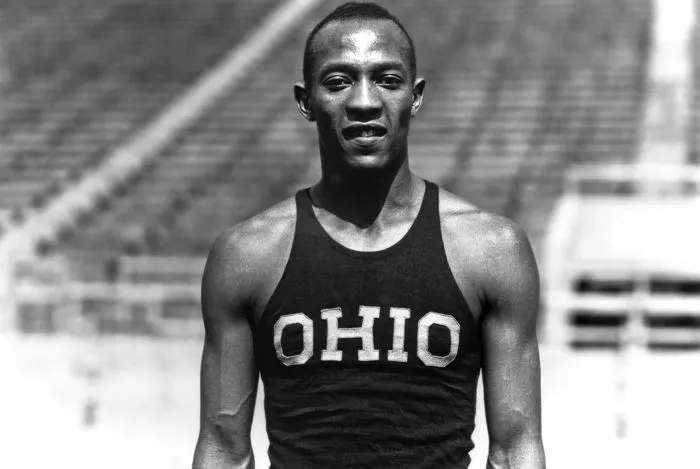James Cleveland “Jesse” Owens, born on September 12, 1913, was an American track and field legend whose impact transcended sports. Renowned for his extraordinary performance at the 1936 Berlin Olympics, Owens clinched four gold medals in a stunning display of athletic prowess and resilience. His achievements not only shattered world records but also challenged prevailing racial prejudices in a time of significant social and political tension. Owens’s legacy endures as a symbol of perseverance, excellence, and defiance against adversity.
1. The Triumph of the 1936 Berlin Olympics
Jesse Owens’s performance at the 1936 Berlin Olympics is legendary. He won four gold medals in the 100 meters, 200 meters, long jump, and 4×100 meter relay, stunning the world and challenging Adolf Hitler’s racial ideologies. Owens’s victories were a powerful rebuttal to the notion of Aryan superiority that was being aggressively promoted by the Nazi regime.
2. A Record-Breaking Athlete
Owens’s Olympic feats were not just victories but record-breaking achievements. He set three world records and tied another at the 1935 Big Ten Championships in Ann Arbor, Michigan, including a world record in the 220-yard dash, a 4×100 meter relay, and the long jump. These performances established him as one of the most formidable athletes of his era.
3. Overcoming Adversity from the Start
Born in Oakville, Alabama, Jesse Owens faced considerable challenges from a young age. Growing up in poverty and dealing with racial discrimination, his early life was marked by struggles. Despite these obstacles, his talent and determination led him to become one of the most celebrated athletes in history, showcasing his ability to overcome personal and societal hurdles.
4. The “Buckeye Bullet”
Owens earned the nickname “Buckeye Bullet” during his time at Ohio State University due to his incredible speed and agility. This moniker became synonymous with his rapid and powerful performances on the track, further cementing his reputation as a top sprinter and long jumper.
5. The Challenge of Returning Home
Despite his monumental success on the international stage, Owens faced challenges upon returning to the United States. He encountered racial discrimination and had difficulty finding suitable employment, reflecting the ongoing struggles faced by African Americans during that era despite his international acclaim.
6. An Advocate for Civil Rights
Owens used his platform to speak out against racial injustices. His experiences and struggles informed his advocacy for civil rights, and he became an influential figure in the fight for equality and social justice. Owens’s voice added a significant perspective to the broader civil rights movement in America.
7. The 1936 Olympic Relay Controversy
A notable incident at the 1936 Olympics was the dispute over the 4×100 meter relay team. Owens initially had to compete with a team of African American athletes, but political pressure led to a change in the relay team’s composition. Despite this, Owens’s performance remained outstanding, and his relay team won gold.
8. The Presidential Medal of Freedom
In recognition of his contributions to sports and civil rights, Jesse Owens was awarded the Presidential Medal of Freedom in 1976 by President Gerald Ford. This prestigious honor underscored the lasting impact of Owens’s achievements and his role as a trailblazer for future generations.
see also: 17 True Facts About Fan Zhendong: Table Tennis Grand Slam
9. The Olympic Boycott Controversy
The 1936 Berlin Olympics were marred by controversy, including debates about whether to boycott the Games in protest of Nazi Germany’s policies. Owens’s participation and success provided a counter-narrative to the political tensions of the time, showcasing the power of sports to transcend political conflicts.
10. The Role of His Coach, Larry Snyder
Larry Snyder, Owens’s coach at Ohio State University, played a crucial role in his development as an athlete. Snyder’s training methods and support helped Owens reach his full potential, and their partnership was instrumental in achieving the success that Owens enjoyed on the global stage.
11. The Post-Olympic Career and Public Speaking
After his Olympic career, Owens engaged in public speaking and promotional work. He became a sought-after speaker, sharing his experiences and insights with audiences around the world. His speeches often focused on themes of perseverance, equality, and the power of sports to effect change.
Summary
Jesse Owens’s life and career are marked by extraordinary achievements and enduring influence. His remarkable performance at the 1936 Berlin Olympics, where he won four gold medals and defied prevailing racial prejudices, established him as one of the greatest athletes in history. Owens’s legacy extends beyond his athletic accomplishments, encompassing his role in advocating for civil rights and inspiring future generations. His story continues to resonate, celebrating the power of perseverance, excellence, and the ability to overcome adversity.
FAQs:
1. Who was the first person to break Jesse Owens’ record?
Ralph Boston.Owens had set the world record in the long jump with a leap of 8.13 m (26 ft 8 in) in 1935, the year before the Berlin Olympics, and this record stood for 25 years until it was broken in 1960 by countryman Ralph Boston.
2. Was Jesse Owens a smoker?
Two years after his induction into the U.S. Track and Field Hall of Fame in 1974, Owens received the Presidential Medal of Honor from President Gerald Ford. A lifetime smoker, Owens was diagnosed with lung cancer in 1979 and passed away in his home in Tucson, Arizona, in 1980.
3. What is Jesse Owens’ famous quote?
We all have dreams. But in order to make dreams come into reality, it takes an awful lot of determination, dedication, self-discipline, and effort.
4. What animal did Jesse Owens race?
Horses.Owens raced against horses for money.“People said it was degrading for an Olympic champion to run against a horse,” Owens said, “but what was I supposed to do? I had four gold medals, but you can’t eat four gold medals.”

